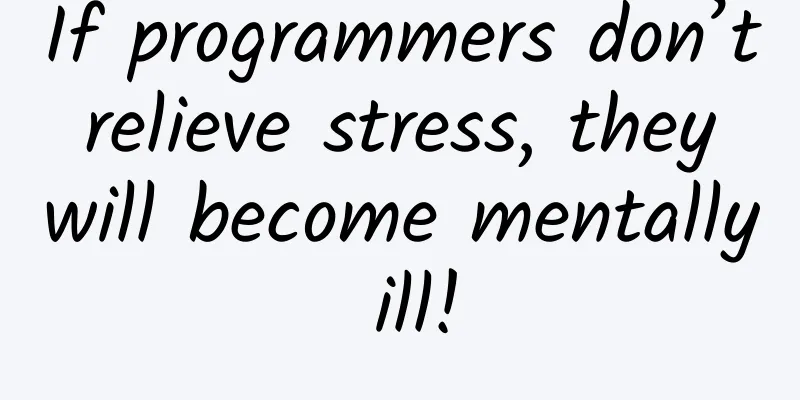If programmers don’t relieve stress, they will become mentally ill!

|
Being a software programmer is one of the best jobs in terms of income and job stability, but it's terrible for your mental health. As a programmer, there are two things that can drive them almost crazy.
One of these is the so-called "imposter syndrome." A programmer may suffer from this condition when he is so certain that the other programmers he works with are smarter, more talented, and more skilled that he lives in constant fear that others will discover that he actually has no intelligence, skills, or accomplishments and is just filling in the gaps. It's no surprise that female programmers often suffer from "Imposter Syndrome," a condition first identified in successful women by psychologists Pauline Rose Clance and Suzanne Ime. It's also the subject of several self-help books for women. But many, and a growing number, of male programmers also say they feel they suffer from imposter syndrome. These people tend to hold themselves to very high standards, and they hold others to very high standards. Imposter syndrome is common in professions that require peer review. Software programmers are one such profession, especially open source software, where anyone can view the code and modify it. From fake to real programmer Imposter syndrome manifests itself when the programmer always thinks he needs to work twice as hard to be good enough. This means he needs to spend more time coding, using every waking minute, taking on more and more projects. Recently, in a popular post on Reddit, people with this symptom were called "real programmers." Real programmers live just to code. The author said: A true programmer is someone who loves programming! They love programming so much that they spend all their time doing it. Real programmers don't think of programming as a "job". If a programmer doesn't volunteer to work 60-80 hour weeks (remember, no overtime pay) because the work is "fun", they're not a real programmer. This perception permeates the culture of the computer industry. If you want to be successful as a programmer, you have to at least look like a real programmer. So you see programmers working nights and weekends, and they gradually feel burned out. It's not news that programmers work long hours. But it is news that they do so voluntarily, for the sheer joy of it. For example, a decade ago, during the dot-com bubble, a book called Death March became a bestseller. It chronicled how programmers were suffering from health problems because of their frantic work schedules. It concluded that mismanagement of the computer programmer industry was to blame. In 2004, programmers actually sued Electronic Arts over overtime and won a $15 million settlement. In 2010, a post written by the wife of a programmer at Rockstar Games went viral online, revealing how companies forced programmers to work six days a week, 12 hours a day, for months or even a year, causing some programmers to suffer from health problems. By 2011, people were beginning to rethink what it meant to be a programmer. A post on the social network StackExchange went viral, asking, “Does it mean I’m a bad programmer because I don’t code in my spare time?” The general consensus is that a good programmer can work only during normal working hours, but, "the best programmers code in their spare time." Long working hours lead to low efficiency Students at Stanford University studied programmer productivity, and their findings shouldn't come as a surprise: working too many hours reduces productivity. A programmer working 60 hours a week tends to produce less high-quality code than a programmer working 40 hours a week. The findings haven’t stopped the prevalence of imposter syndrome, and there have been some pretty sad stories. For example, about a year ago, a programmer named Kenneth Parker posted a post on his blog: "I know a completely crazy programmer." The article tells the story of a colleague of the author who was working so hard that he had a "complete mental breakdown." His colleague was one of the most diligent workers in the industry. He often worked overtime, and he was always willing to take urgent work assigned by his superiors on weekends. His diligence was the reason why his superiors liked him. However, his efficiency was not very high, and he suffered a mental breakdown. Recently, Nick Floyd, a software engineer at New Relic, began writing about "Life Balance for Employees." He confessed that he once suffered from "Impostor Syndrome" and now believes that he can only be happy if he finds a job he loves. He wrote: Working at New Relic is challenging, hard, and scary at the same time. Before joining, I had bought into the belief that work is often forced, often frustrating, and that the enjoyment of life lies outside of work. But I was wrong — life can be great when that thing called 'work' becomes another way to express your passion. He also provided the most sensible solution: I really wish we lived in a society where we were not defined by our day jobs and working ourselves to death was not seen as a virtue. |
<<: Tutorial: How to reduce the size of iOS app?
>>: Why is 2015 a breakthrough year for artificial intelligence?
Recommend
14 lessons on how to monetize your listening manuscripts without any basic knowledge, earning over 5,000 yuan a month in your spare time while studying
Muzi Traffic: What kind of side job is a good sid...
The Pacing algorithm behind Facebook's advertising system
[[163141]] Last month, Facebook released its eye-...
Don't rush to take a picture of a bug on your face! The unique skills of the fart beetle, the "disfigurement" of chemical weapons is too scary
Recently, there was a news report that a citizen ...
As Apple continues to poach talent in the AR field, several AR-related call files have been added to the iOS development framework
[[171830]] Recently, iOS developer Steven Trought...
How do you pronounce the last digit "X" on your ID card? You may have been reading it wrong!
How do you pronounce the last digit "X"...
In-depth review: The conversion rate is only 9%, I summarized 6 pitfalls
As one of the proven effective means of attractin...
Are there any differences in the traffic pools of information flow accounts in different industries?
During the delivery process, we often encounter t...
China Passenger Car Association & Anluqin: The new four modernizations index of passenger cars in April 2020 is 53.8
The Passenger Car New Four Modernizations Index, ...
The results of Maradona's autopsy were announced, and Argentina mourned for three days!
The results of Maradona's autopsy were announ...
The legendary "Chanhao Bird" is not actually a bird, but a magical animal.
We have always regarded the Cuckoo as a bird, but...
14 tips to improve the conversion rate of advertising landing pages!
This article is a summary of the book "The B...
Why more and more young people cannot live without "life-saving coffee" every day?
Audit expert: Yin Tielun Deputy Chief Physician, ...
The first cancer vaccine trial program with a scale of 1,000 people has been launched, marking a "milestone moment" in cancer treatment
Humanity may have taken a big step towards curing...
Hu Q&A: Why do tightly tied shoelaces loosen by themselves?
Source of this issue: Hanmu Diaomeng, how do plan...
From the perspective of "friend circle is visible for three days", let's talk about how we should face social networks
Why should you set your Moments to be visible onl...









